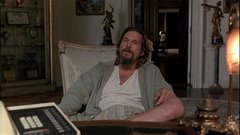
"I Think, Therefore I Am... I Think"
That's the title of a fascinating article by Stephen Cage who, before gifting me this piece, had never contributed to my life in any way. So I can't follow up his name with "writer of..."'s and "from such movies as..."'s. I could just Google him and fix that little problem while sounding as if I actually knew something about the dude. But I'm not that pretentious. Plus there were too many Stephen Cage's on Google and I didn't get anywhere after 43 minutes of sifting.
I have provided a link to this article at the conclusion of my writings here today, so I advise you to check it out either now, or after being worked up into a frenzy by my insights into this matter. I have also provided a link to one of my favorite clips from the movie 'Waking Life', which tackles a lot of fascinating philosophical topics.
Free Will.
Is God just lounging on a La-Z-Boy punching in XBox controller buttons to make us involuntarily run into walls, slay innocent creatures, and dance around our apartment aimlessly so our Sims boredom level doesn't drop down to critical levels? Or are we in control of Tiger Wood's golf swing when we Wii? This question has been around as long as philosophers and thinkers began asking questions(and began playing Halo online). And there's simply not a yes or no answer to it. If you think that you do have free will, that at any moment during the reading of this blog you can decide to direct your browser to Youtube and suck away the minutes by watching Japanese game shows instead, you're oversimplifying the process. And if you think you don't have it, that God knows in advance what the path that you'll be treading looks, feels, and smells like, a host of other problems arise: responsibility, accountability, self motivation, what the hell is the point of the creation of mankind if we have no choice, on and on. You can't even dodge the question if you're an atheist. There are all sorts of scientific complications here too, as you'll read about in Stephens article.
I found myself, and even right now find myself, struggling with a resolution to this whole topic. This article took it to a whole nother level. Particularly the discussion about the neurobiological angles. The fact that our neurons have already set the realization of an action in place before we've even made a conscience decision to make that action is really messing me up. And then it had to go and reference a study that showed that when our neurons are manipulated to prepare for one action in particular, not only would it incite the subjects to act accordingly, but it would also make the test subjects believe that they acted out of their own free will. So for instance, let's say I'm a doctor, and I zap you with some electrical current that makes you want to read this here blog, and you oblige. When you finish reading you'll still believe that it was you're decision to read on, that you were exercising free will. Now you might be saying that this example isn't a very good one, because once you pop one of my entries into your mouth, you just can't stop. But you get the idea. Some argue that since we are nothing more than an elaborate collection of atoms, molecules and the like, that our actions are only dependent on the interactions between these properties, and that's that. Like a piece of machinery that operates according to how the nuts and bolts are arraigned, and not how it feels like operating. A car has to run like a car, and not like an aircraft carrier. Individuality in that context would be nothing more than a paint-job.
There's talk in the article about combining philosophical thought with scientific discovery. And perhaps using the two together to try and come up with new kinds of explanations for some hard to explain behaviors . That sounds like an extremely powerful idea. It also seems like an idea that could potentially lead to all sorts of updates to old theories. The evolution of such an alliance might make the world we live in look totally alien in the future. It could force us to revamp some fundamental social institutions.
Personally, I think that since we know so little, in the bigger scheme, about what happens when microscopic molecules come together to form complex physical structures(why they come together for that matter) we can't be sure whether the output behaves on it's own accord or according solely to what it's design is dictating it to behave like. It's one thing to say that a Honda behaves like a Honda, and not like an F-16, but a totally different thing to say that a hyper computer(some future machine of technological genius) ought to behave like a Dell. Who knows what would happen when you input that much technology into a machine. Until it can be proven that the complexity of an entity doesn't make it more than just the sum of it's parts, I think you can't rule out the possibility that the entity would be governed by more than just it's constituents. Then again maybe because of the complexity no central mainframe exists, like a corporation. I haven't been able to be at piece with any one answer, I guess all I can do for now is go about my business with the thought that just believing that I have freedom in my decision making, forces me to be at my most productive.
I Think Therefore I Am, I Think Article Link:
http://www.ft.com/cms/s/81bc32e4-d5e3-11db-99b7-000b5df10621.html
Clip From 'Waking Life':
http://www.youtube.com/watch?v=_VxQuPBX1_U
Japanese Game Show:
http://www.youtube.com/watch?v=aEKqU1fkYCI





